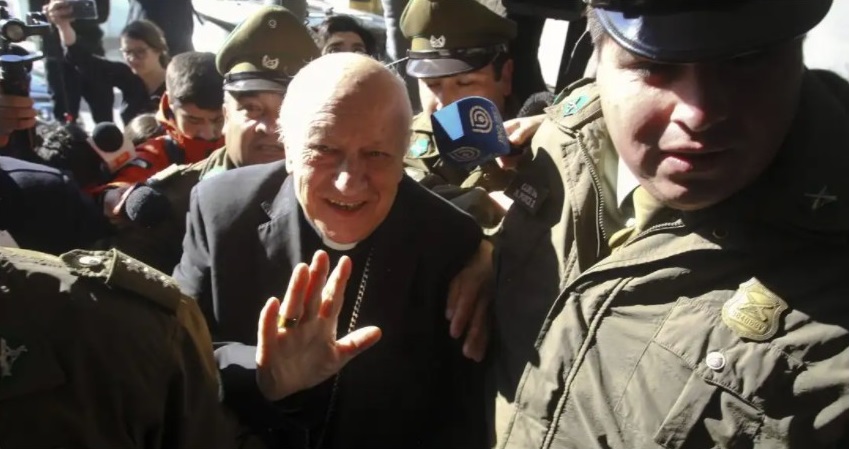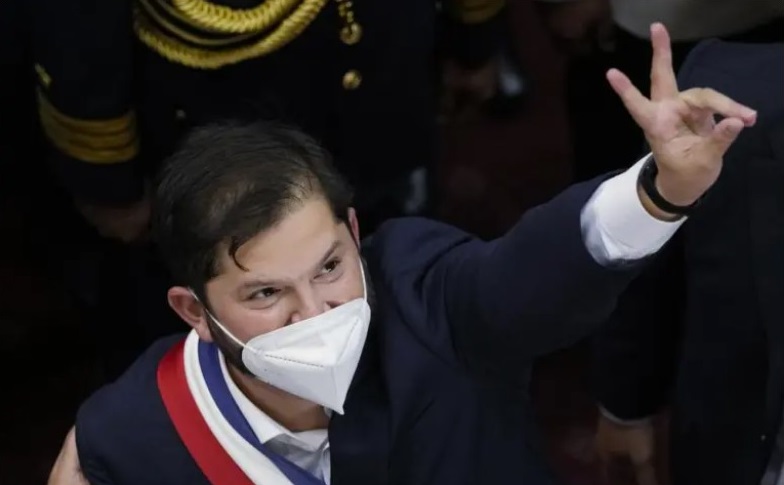(CHILE)
Crux [Denver CO]
March 19, 2022
By Inés San Martín
Rome – Gabriel Boric, the charismatic former student activist who swept to the presidency in Chile last December and is now the second-youngest head of state in the world, marked the end of his first week in charge on Friday.
There’s at least one group in Chile clearly put on notice there’s a new sheriff in town – the country’s Catholic bishops, who presided over the most massive clerical abuse crisis anywhere in Latin America.
On Saturday, following his inauguration and in keeping with tradition, Boric took part in an ecumenical prayer service held in Santiago’s cathedral and led by Spanish-born Cardinal Celestino Aos, who’s still relatively new himself.
On Sunday, the president was again in the spotlight for the conclusion of his installation, and the 36-year-old left-leaning politician gave a hint as to what his relationship with the bishops will be during the next four years.
“There is something that bothered me yesterday to see in the Cathedral. It bothered me to see Mr [Cardinal Ricardo] Ezzati. It bothered me to see people who have acted to cover up serious crimes against children.”
By using the word “people,” Boric appeared to refer also to retired Cardinal Francisco Errazuriz, who had served as a member of Pope Francis’s council of cardinals until 2018 when his term was not renewed. (Fellow papal counselor Australian Cardinal George Pell’s term was also not renewed after he left Rome to face allegations of historic sexual abuse, though he was later acquitted).
Never one to take accusations lying down, Errazuriz fired back against the new leader in an interview with local outlet La Segunda.
“Even the Presidents of the Republic can make mistakes,” he said, insisting he was not offended by the new president’s words, but offering a vigorous defense of the Chilean Church’s actions towards its most infamous abuser priest, the late Father Fernando Karadima.
“Apparently, Mr. Gabriel Boric does not know everything we did to know about the abuses of Karadima, which were covered up by many of his disciples, the trial we opened on him, lifting the statute of limitations on the facts and the punishment imposed on him by the Vatican, removing him from the priesthood,” Errázuriz said.

In fact, the first accusation against Karadima- who died in 2020, a year after being defrocked- was made in 2003, and if any investigation was carried out – to this day, it’s not clear what happened – Karadima faced no consequences. It wasn’t until three survivors, including one who today is a member of the papal commission for the protection of minors, went public with allegations years later that a proper investigation happened.
Karadima was found guilty and removed from ministry in 2011. Seven years later, he was actually removed from the priesthood.
Some observers might be tempted to dismiss Boric’s comments as fairly routine political rhetoric, reducing them to off-hand remarks from a left-wing politician whose government coalition includes Chile’s Communist party.
However, many experts believe Boric was doing more than playing to his base. By calling out Ezzati and Errázuriz’s presence, he was inadvertently asking a question that has gone unanswered both by the Vatican and Chile’s judicial system.

To fully understand the context, it is necessary to go back to 2018/2019, when following a series of reports that for decades clergy in Chile had abused minors and bishops had covered up the crimes, Pope Francis purged the conference by forcing a mass resignation. Thirty percent of Chile’s episcopacy was removed from office in a span of 12 months.
Three years later, however, wounds are still fresh, in part because too many questions remain unanswered. For example, no specific explanation was given as to why some bishops under the age of 75 – the mandatory age for a prelate to present his resignation – were being removed from their positions. And several prelates over 75 were also put out to pasture with question marks hanging over their heads. People were left to wonder if they had been abusers, covered it up, or if there was something else going on.
At least one bishop faced accusations from former seminarians who claimed he had sexually abused them. The case of Bishop Juan Barros, the one-time bishop of Chile’s military, did get attention. He was transferred by Francis in 2015 to the southern diocese of Osorno. However, when the decision was announced, three of the survivors of Karadima publicly accused Barros of having covered up for the abusive priest, who happened to be his mentor. (He is just one of four bishops who have been accused of doing so).
Francis stood by his decision and then publicly defended Barros during his trip to Chile in 2018. Yet, upon his return to the Eternal City, he dispatched two trusty advisers to investigate the allegations. The 2,300-page report they compiled led to the pope calling the entire Chilean episcopate to Rome, where the prelates presented their resignations en masse. Francis also met with survivors and publicly apologized to them, acknowledging that he had been “part of the problem” in handling the abuse crisis in the country.
On the canonical side, several abusers have been removed from the priesthood, including Karadima. Yet the bishops and cardinals who faced allegations have been removed from office but not from ministry and remain in limbo: Their names have been tainted by suspicion but they are free to do as they please, including attending events such as Saturday’s.
On the civil side, forced in part by the relentless actions of survivors who found a platform both in national and international media, there were a series of investigations launched. Cardinals and bishops were called to testify, but to date, very few priests have actually been condemned, and there has been no follow-up to the allegations of a cover-up.
Arguably, one of the few tangible outcomes of the crisis was former president Sebastian Pinera lifting the statute of limitations for sexual abuse of minors in 2019, though it is not retroactive.
Victims of abuse have long accused Errazuriz of covering up for Karadima and others, and when Francis accepted his resignation in 2019, Ezzati was facing an abuse cover-up probe by the civil authorities. However, for almost three years now, the prosecutor’s office has said nothing about the investigation, and it seems to be at a stand-still.
As a footnote, the prosecutor who originally handled many cases against the church was removed from the investigation following a long string of leaks.
Though bishops like Errazuriz and Ezzati have been convicted in the court of public opinion, neither the Vatican nor Chile’s justice system has condemned them. The opening salvo from Chile’s new leader, however, suggests the battle may be just beginning.
Follow Inés San Martín on Twitter: @inesanma
